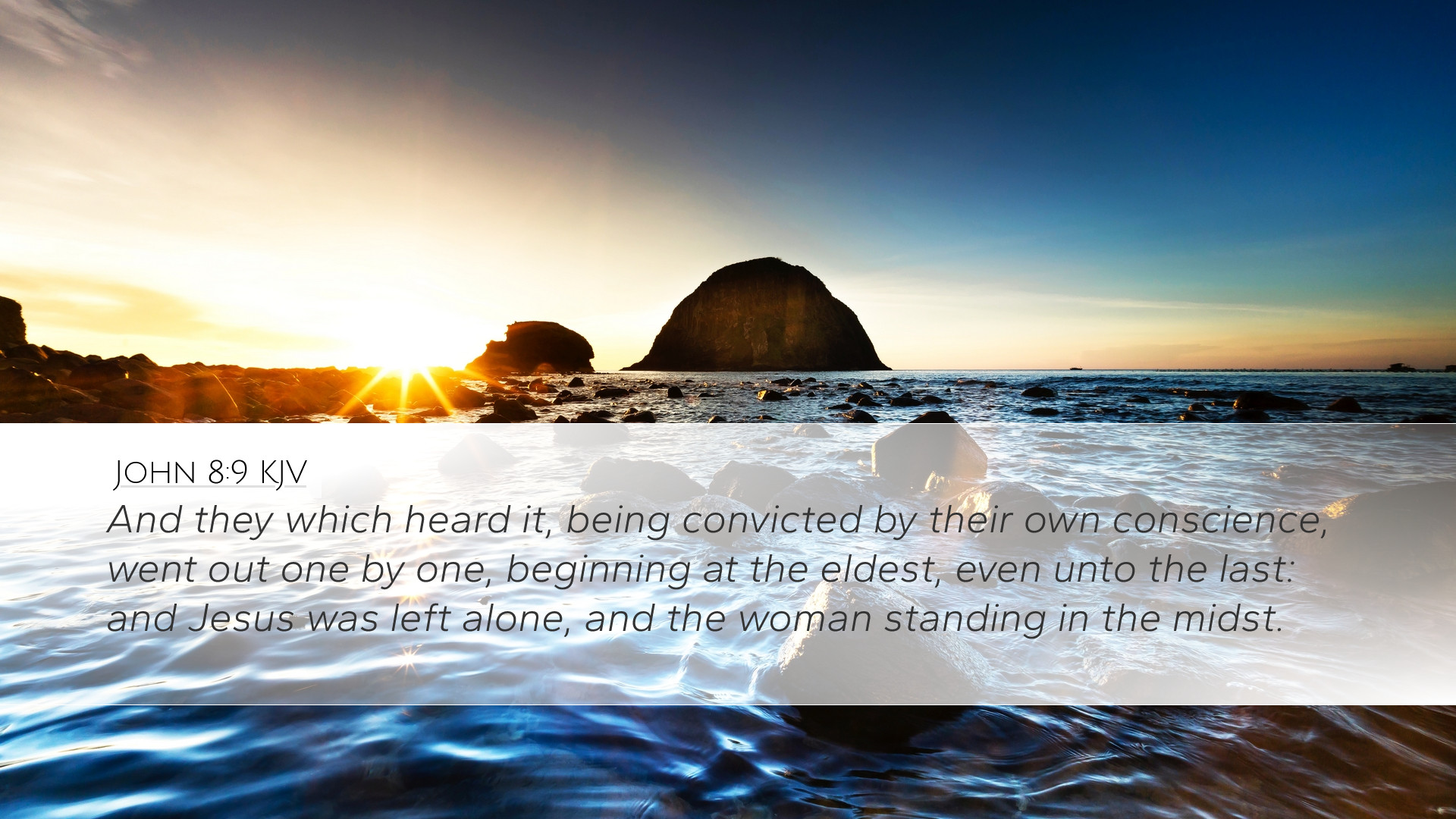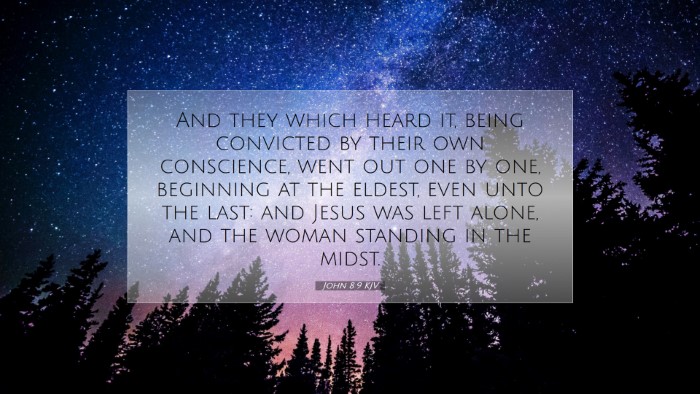Commentary on John 8:9
John 8:9 is a pivotal verse in the narrative of the woman caught in adultery, providing profound theological and moral insights that resonate deeply with Christian doctrine and practice. The verse reads: "And when they heard it, being convicted by their own conscience, went out one by one, beginning at the eldest, even unto the last: and Jesus was left alone, and the woman standing in the midst."
Contextual Overview
In the broader context of John 8, Jesus is confronted by the Pharisees and scribes who bring before Him a woman accused of adultery. They seek to challenge His authority and determine how He will reconcile the law of Moses with His teachings of mercy and grace. This situation encapsulates the core struggle between legalism and the heart of God's intention for humanity.
Insights from Public Domain Commentaries
Matthew Henry's Commentary
Matthew Henry notes the profound implications of the response of the accusers. Their departure signifies a weighty acknowledgment of their own guilt. The phrase "being convicted by their own conscience" underscores the significant role of self-examination and moral accountability. Henry emphasizes that the eldest likely recognized their failures more acutely, suggesting that wisdom often accompanies age and experience.
- Conviction of Sin: Henry highlights that the law acts as a mirror, reflecting our failings. The accusers' retreat demonstrates how even those most intent on condemning others are not exempt from the scrutiny of their own actions.
- Grace in Judgment: The act of leaving one by one illustrates the layered nature of mercy; Jesus does not condemn them outright but allows the weight of their own conscience to lead them away.
Albert Barnes' Commentary
In his exegesis, Albert Barnes focuses on the character of the individuals involved. He points out that the acknowledgment of their own sins signifies a powerful lesson in humility. Barnes asserts that rather than seeking to enforce the law against the woman, the accusers were reminded of their own moral failings.
- The Role of Conscience: Barnes stresses the importance of the voice of conscience; it is a God-given mechanism that leads us to recognize our own shortcomings.
- Hierarchy of Sin: Barnes suggests that the older individuals understood the weight of their sins better than the younger ones, which might indicate a progression in spiritual maturity.
Adam Clarke's Commentary
Adam Clarke offers rich theological reflections on John 8:9, emphasizing the transformative power of Christ's presence. Clarke points out that the confrontation with Jesus leads to a moment of self-reflection for the accusers. His analysis suggests a central theme of this passage: the readiness to forgive and the necessity of self-examination before judgment.
- The Nature of Forgiveness: Clarke posits that Jesus represents divine grace, encouraging a posture of forgiveness rather than condemnation, which aligns with His ministry of reconciliation.
- Spiritual Reflection: The departure of the accusers reflects a moment of profound realization about their own spiritual condition, highlighting that acknowledging one's sin is the first step towards redemption.
Theological Implications
John 8:9 invites Christians to reflect on several key theological principles:
- Moral Accountability: This passage challenges believers to engage in self-examination and recognize their own imperfections before pointing out the faults in others.
- Role of Conscience: The innate conscience that God has given humanity serves not only as a guide but also as a catalyst for repentance and restoration.
- Principle of Forgiveness: The stance of Jesus towards the accusers underscores the radical nature of grace, inviting us to navigate our relationships with mercy and humility, echoing the central message of the gospel.
Conclusion
In summary, John 8:9 serves as a powerful reminder of the tension between law and grace, judgment and mercy. The insights drawn from renowned commentaries highlight the necessity for personal introspection and the redemptive hope that Christ offers to all who find themselves in moral and spiritual struggle. For pastors, students, and theologians, this text is not only a historical account but a living lesson on the nature of sin, grace, and the challenge of loving one another despite our failings.


